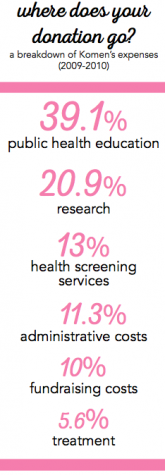The Problem with Pink
The negative impact of Susan G. Komen’s pinkwashing
November 3, 2017
It’s impossible to get through the month of October without witnessing or taking part in the extravagant pink frenzy. Everything, from M&Ms to the White House in 2011 to hundreds of students on Pink Out Day, is doused in pink. The iconic ribbon has become a symbol of hope for millions of people suffering from or caring for someone battling breast cancer. Despite this, Susan G. Komen has been scrutinized from the start for everything from their salaries to their advertising techniques, to their hypocrisy. It’s important to understand that some charities are just like any other company: they want your money. The horrific aspect of this fact is how they choose to spend your money.
 In 2012, Komen’s founder and CEO Nancy Brinker’s average salary was $684,000. Any CEO of a non-pro t that makes more than the salary of US presidents is making too much. Yes, you can argue that a competitive salary encourages a better job per- formance, but when people donate to Komen, they probably expect it to go to breast cancer research and treatment, not an overpaid CEO. Even though Brinker stepped down, she is still making $397,093 for being listed as the founder while the new CEO, Dr .Salerno, is being paid $479,858.
In 2012, Komen’s founder and CEO Nancy Brinker’s average salary was $684,000. Any CEO of a non-pro t that makes more than the salary of US presidents is making too much. Yes, you can argue that a competitive salary encourages a better job per- formance, but when people donate to Komen, they probably expect it to go to breast cancer research and treatment, not an overpaid CEO. Even though Brinker stepped down, she is still making $397,093 for being listed as the founder while the new CEO, Dr .Salerno, is being paid $479,858.
Komen has been under fire multiple times for their misleading marketing tactics. In October 2011, Komen focused on advertising mammograms, X-rays that show tumors in the breast.
Their claim was that “the five-year survival rate for breast cancer when caught early is 98% and when it’s not, 23%.” Komen chose not convey that mammograms have just as many risks and they do benefits. Why is a non-profit that prides themselves in their determination focusing more on selling screenings that could misdiag- nose and potentially harm patients?
Whether we choose to view it this way or not, the truth is that breast cancer is an industry. An industry fueled by pinkwashing: the promotion of commercial goods by slapping the pink ribbon on various products in support of breast cancer “awareness.” Komen has partnered up with oil corporations, car companies, KFC and other businesses which all produce goods linked to carcinogens. Their own perfume, “Promise Me” was discontinued for containing questionable chemicals. The evidence of their hypocrisy and lack of integrity is glaring.
It isn’t fair to say Komen doesn’t help survivors at all. Before they came around, the topic was taboo, and breast
cancer was underdiagnosed. And Charity Navigator did give them praise on their transparency and contributions to public health education. But the entire point of a non-profit charity is that they agree to operate with the sole purpose of achieving their goals. This can’t be accomplished by buying buckets of fried chicken and being decked out in pink for one Friday in the school year. We’re already aware of breast cancer. Now it’s time for a bigger step forward.





